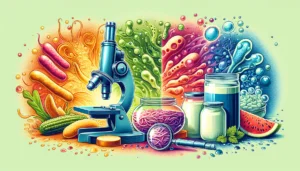The Role of Daily Vitamins in Maintaining Mental Health
Understanding the Connection Between Vitamins and Mental Health
The Importance of Vitamins for Brain Function
Vitamins play a crucial role in maintaining optimal brain function and overall mental health. Each vitamin contributes uniquely to various biochemical processes that affect mood, cognition, and emotional wellbeing. For instance, B vitamins are essential in neurotransmitter synthesis, while vitamin D is linked to mood regulation.
Key Vitamins and Their Role in Mental Health
-
Vitamin B Complex
B1 (Thiamine): Thiamine is pivotal in glucose metabolism and energy production in brain cells. Deficiency can lead to fatigue, irritability, and cognitive decline.
B2 (Riboflavin): This vitamin supports overall brain energy production and has been suggested to help reduce symptoms of depression.
B3 (Niacin): Niacin aids in synthesizing neurotransmitters like serotonin. Low niacin levels have been associated with anxiety and mood disorders.
B6 (Pyridoxine): Vitamin B6 is fundamental for the production of neurotransmitters, including serotonin and dopamine. These neurotransmitters are crucial for mood regulation.
B9 (Folate): Folate deficiencies have been linked to higher rates of depression and cognitive impairment. Foods rich in folate support brain health and emotional well-being.
B12 (Cobalamin): Deficiency in B12 can lead to neurological issues and increased depression risk. It is essential for maintaining the myelin sheath around nerves, directly influencing mood and cognitive function.
-
Vitamin D
Often referred to as the “sunshine vitamin,” vitamin D is critical in regulating mood. Research indicates that adequate vitamin D levels can reduce the risk of depression. Vitamin D receptors are abundant in the brain, particularly in areas involved in emotion regulation.
-
Vitamin C
Vitamin C is known for its antioxidant properties, protecting brain cells from oxidative stress. It also plays a significant role in the synthesis of neurotransmitters like dopamine. Studies suggest that higher vitamin C levels are associated with better mood and cognitive performance.
-
Vitamin E
As another powerful antioxidant, vitamin E can help reduce oxidative stress in the brain, which has been linked to cognitive decline and mood disorders. Adequate vitamin E intake may improve overall brain health and reduce the risk of dementia.
-
Omega-3 Fatty Acids
Although not classified as vitamins, omega-3 fatty acids significantly impact mental health. They contribute to the maintenance of neuron structure and function. DHA and EPA, the primary forms of omega-3s, have been shown to reduce symptoms of depression and anxiety significantly.
The Mechanisms Behind Vitamins and Mental Health
Neurotransmitter Synthesis
Vitamins are critical for the biosynthesis of neurotransmitters, essential for effective communication between neurons. For instance:
- Tryptophan, an amino acid converted into serotonin, requires various B vitamins for its transformation.
- Tyrosine, involved in dopamine production, is also influenced by vitamin B6, making it essential for mood regulation.
Hormonal Balance
Several vitamins affect hormonal balance, including cortisol and serotonin levels. Vitamin D, for instance, is linked to serotonin production, impacting mood. Furthermore, imbalances in hormones can lead to anxiety and depressive disorders, highlighting the need for adequate vitamin intake.
Gene Regulation
Vitamins influence gene expression related to mental health. Research indicates that certain vitamins can turn on or off genes associated with inflammation and mood regulation. This gene-modulating effect underscores their role in mental health treatment and prevention.
Food Sources of Essential Vitamins
-
Vitamin B Complex: Whole grains, eggs, nuts, meat, green leafy vegetables, and dairy products are excellent sources. Foods like chickpeas, lentils, and asparagus are particularly rich in folate.
-
Vitamin D: Fatty fish (such as salmon and mackerel), fortified dairy products, and exposure to sunlight contribute to vitamin D levels. Mushrooms also add to dietary sources when exposed to UV light.
-
Vitamin C: Citrus fruits (oranges, lemons), strawberries, bell peppers, broccoli, and tomatoes are rich in vitamin C.
-
Vitamin E: Nuts (especially almonds), seeds, and green leafy vegetables are high in vitamin E.
- Omega-3 Fatty Acids: Found in fatty fish, flaxseeds, walnuts, and chia seeds, these fatty acids are indispensable for mental health.
The Impact of Deficiency
Deficiencies in vitamins can lead to significant mental health issues:
- Vitamin B12 and Folate Deficiencies: Linked to increased rates of depression and cognitive decline.
- Vitamin D Deficiency: Associated with seasonal affective disorder (SAD) and generalized anxiety.
- Vitamin C Deficiency: Can lead to fatigue, mood swings, and impaired cognitive functions.
Aging and Vitamin Needs
As individuals age, the body’s ability to absorb vitamins and nutrients diminishes, increasing the need for a diet rich in essential vitamins to maintain mental health. Older adults are particularly at risk for deficiencies in B12 and D due to reduced dietary intake and less exposure to sunlight.
The Role of Supplements
While obtaining vitamins from food is always recommended, supplements can help bridge the gap for individuals unable to meet their dietary needs. It’s crucial to approach supplementation judiciously:
- Consult with healthcare providers before beginning any supplementation.
- Pay attention to the bioavailability of vitamins in supplements.
- Choose high-quality supplements from reputable sources.
Lifestyle Factors Affecting Vitamin Levels
-
Dietary Habits: A diet high in processed foods can lead to nutrient deficiencies. Emphasizing whole foods can help ensure adequate vitamin intake.
-
Stress: Chronic stress can deplete vitamin levels in the body, particularly B vitamins and vitamin C, making stress management crucial for mental health.
-
Exercise: Regular physical activity enhances nutrient absorption and supports mental well-being. Exercise may also increase the body’s need for certain vitamins.
-
Sleep: Quality sleep is vital for vitamin D metabolism and overall brain function. Poor sleep can negatively impact vitamin absorption and mental health.
- Alcohol and Substance Use: Excessive alcohol consumption can inhibit the absorption of several essential vitamins, particularly B vitamins, exacerbating mental health issues.
Mental Health Disorders and Vitamins
Research has indicated promising findings regarding the role of vitamins in managing specific mental health disorders:
-
Depression: Studies show a significant association between low vitamin D and increased depression. Supplementation can reduce symptoms in deficient individuals.
-
Anxiety Disorders: B vitamins may help mitigate anxiety symptoms, and deficiencies are often prevalent in individuals suffering from anxiety.
- Cognitive Disorders: Proper intake of B vitamins, vitamin E, and D can reduce the risk of cognitive decline in older populations.
The Future of Vitamin Research in Mental Health
Ongoing research continues to unlock the complexities of how vitamins influence mental health. Future studies aim to establish clearer connections between specific vitamins and various mental health outcomes to develop targeted dietary recommendations and interventions.
Conclusion: Integrating Vitamins Into a Mental Health Strategy
Integrating sufficient vitamins into daily life supports overall mental wellbeing. A holistic approach to mental health will include proper diet, hydration, exercise, and lifestyle adjustments. By prioritizing vitamin intake, individuals can enhance their mood, cognition, and emotional resilience.
Through understanding the scientific basis of vitamins and their impact on mental health, individuals can make informed choices about their dietary habits and mental wellness strategies.








